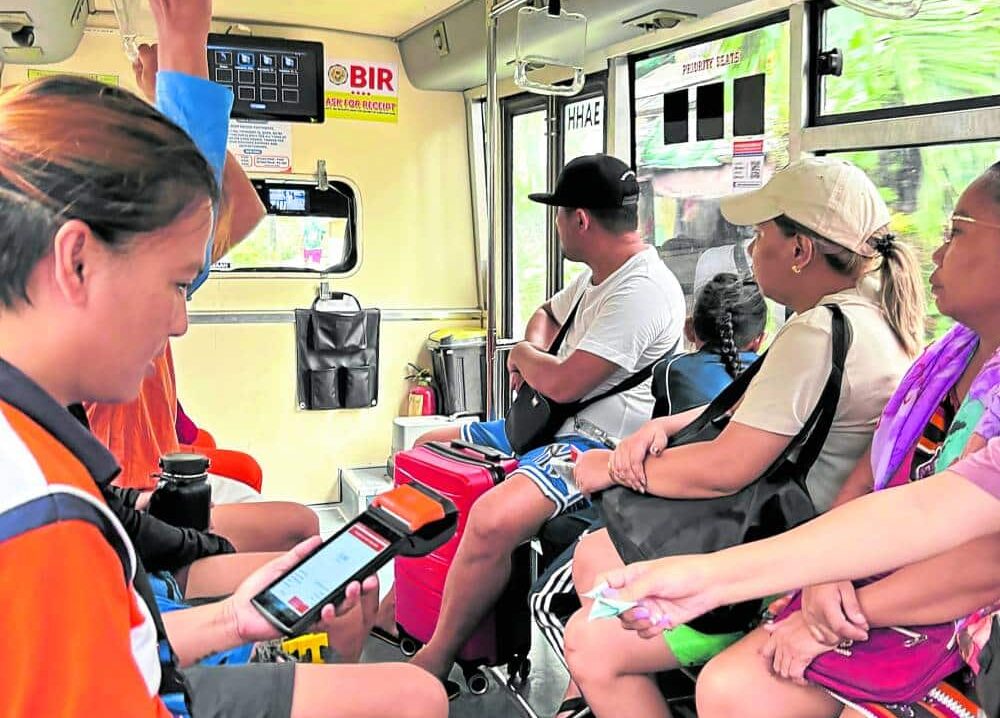
MOBILE PASS A conductor processes ticketing for Boracay hop-on hop-off shuttle service —Contributed photo
.
Filipinos have become accustomed to turning on mobile data to access the internet for work, study and entertainment—and the usage of this wireless connectivity is only expected to increase with the advent of 5G.
Telco giants Globe Telecom Inc. and PLDT Inc. have seen mobile data traffic grow steadily since the pandemic encouraged major shift to digital platforms.
Last year, Globe saw mobile data traffic grow by 28 percent to 5,960 petabytes from 4,658 petabytes a year ago. This was three times more than its record prior to the pandemic or in 2019.
Mobile data traffic facilitated by PLDT, meanwhile, rose by 11 percent to 4,898 petabytes last year. The latest print showed more than threefold growth from 1,600 petabytes in 2019.
“The pandemic sped up consumer adoption of data services delivered via mobile and broadband connectivity as more Filipinos adopted a digital lifestyle, be it for work, study, business, entertainment and social networking,” Globe vice president and head of consumer mobile business Darius Jose Delgado tells the Inquirer.
Alex Caeg, head of consumer business at PLDT wireless unit Smart Communications, explains these “habits were further embedded in the Filipino way of life during the pandemic and endures well after.”
“Filipinos are avid consumers of mobile data,” especially for video streaming, Caeg tells the Inquirer. Delgado notes that social media is also among the reasons why Filipinos are going online.
A study by media intelligence firm Meltwater and creative agency We Are Social reveals that 55.6 percent of the internet users in the country, aged 16 to 64, watch vlogs each week. This is way above the 25.6-percent global benchmark.
The same study reveals that Filipinos spend about three hours and 43 minutes daily on social media, higher than the global average of 2 hours and 31 minutes.
5G adoption
Moving forward, a heavier mobile data traffic in the Philippines is anticipated as more Filipinos test out 5G connectivity.
According to Statista, the mobile data market in the Philippines could reach $2.9 billion this year, slightly better than $2.7 billion in 2023. Further, revenues of this segment are projected to eventually reach $3.7 billion by 2028.
Global technology firm Nokia CEO Pekka Lundmark explains that 5G technology is likely to have greater adoption in the country in the coming years, thanks to expansion of related infrastructure.
“We have seen in many parts of the world that operators invested a lot in 5G in 2021 and 2022. Now they have a lot of capacity available,” he explains.
Globe’s 5G network covers 98.35 percent of the National Capital Region and 92.86 percent of key cities in VIsayas and Mindanao. Smart’s combined 5G and 4G network is available to 97 percent of the population.
“We see faster adoption of 5G handsets. Those who adopted these 5G devices are taking advantage of the better network experience of 5G,” Caeg says.
The number of Smart users linked to 5G grew to 10 percent of the total subscribers in the first quarter from 9 percent at the end of 2023. The Pangilinan-led telco player has 59 million mobile subscribers.
Globe, which has a subscriber base of 57 million, is accommodating over 6 million 5G devices in its network.
However, Delgado points out that mobile data growth would still be driven primarily by 4G/LTE technology given that “customer demand for 5G technology is still in its early stage.”
“From a consumer experience perspective, 4G/LTE mobile technology already delivers fast internet speeds suited for popular use cases such as video and music streaming, and online gaming,” he adds.
The 5G technology enables download rates of more than 10 gigabits per second, or 100 times quicker than 4G.